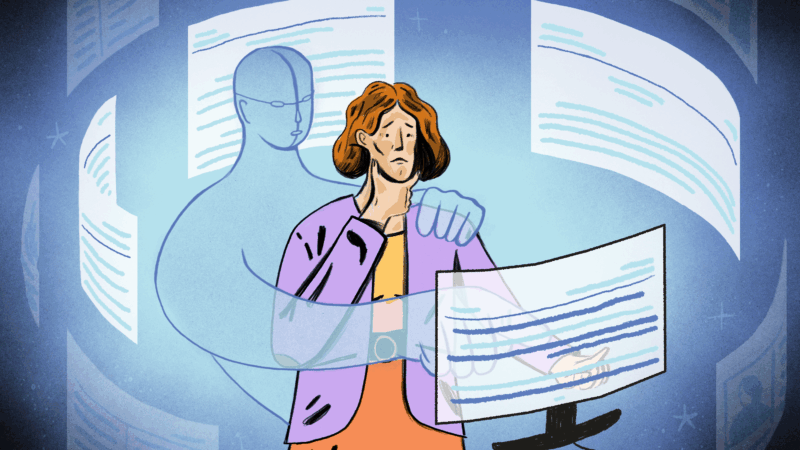Strong Girls
The girls at the Creative Wellness Center on Southside are a mixed bunch. These are 13- to 17-year olds, yet many are as thin as girls half their age, with the baby faces to match. Others look older and tougher. They slouch on sofas underneath dark hooded sweatshirts. There’s an abundance of giant hoop earrings and tattoos.
The girls are here because they’ve made some serious mistakes. They’ve assaulted someone or run away or shoplifted. And so the court required them to attend Strong Girls, a 10-week program that uses the arts to rehabilitate female juvenile delinquents. Jessica Leggitte is a tall, broad 16-year-old in the program. In one semester, she’d missed 38 days of school.
“I was always getting picked on and bullied. And when I tried to get help, they just didn’t wouldn’t listen, so I just stopped going to school.”
And Jessica just stopped talking. She says the counseling at Strong Girls has helped her open up more. She and her mother don’t fight as much. The program uses the arts like dance and poetry to get girls to talk and trust each other. Trust is something that doesn’t come naturally.
“Such a high percentage of our girls – 60 to 70 percent – have been physically and/or sexually and emotionally abused.”
That’s Eve Laxer, head of the Strong Girls program.
“So when that happens, when there’s that kind of trauma, either in childhood or even early adolescence, girls tend to either divorce themselves from their bodies or sexually act out as a survival skill.”
And that’s why reconnecting with their bodies is a huge part of the program.
Dance is one way to do that.
“And we’re constantly referencing, what’s happening in your body now? And when we do that, it helps them have more time between the thought or the emotion and the action. And that’s part of what happens with aggressive behavior is there is no time.”
But Strong Girls makes plenty of time for talk, and on this day, gathered in the basement of the Creative Wellness Center, Jessica and 13 other girls are getting the talk. This is the talk that every parent hates to initiate. The talk that gets awkward.
“How do you know if you have an STD?” they’re asked.
The girls giggle every now and then. But for the most part, the room is quiet, and the girls lean in to hear more.
“If you don’t love yourself, you’re not going to protect yourself.”
Laura Secord, a nurse practitioner at UAB’s HIV clinic, has been giving talks on sexuality for the last couple of years.
“And Strong Girls does a good job of looking at that comprehensive thing of making you feel good about yourself, feel like you’re valuable, feel like it’s worth protecting yourself. But it’s a huge thing to deal with the issues of sexuality, STD’s and pregnancy if you don’t have much self-esteem.”
One self-esteem builder is the sister circle. At the beginning of every session, the girls sit in a circle and take turns rating their day. During one session, Jessica was about an 8. She shared that she knew of a girl in her neighborhood who was trying to steal her boyfriend. Besides being supremely confident that the girl wouldn’t win out, she was most proud of the fact that she didn’t lose her temper. The girls often applaud each other for these little triumphs.
The girls also do drum circles and write poetry. Eve Laxer says these things offer a chance to really shine at something for the first time.
“In many cases, nobody’s really identified out loud the strengths that are seen in these girls. And so it make such a huge difference to them when it’s brought to their attention or when there’s some help given in them discovering their own strengths and talents that they didn’t know were there.”
Laxer says Strong Girls offers things that boot camp cannot: relationships, self-expression, reality checks on what they’re thinking and feeling. But mostly, a sense that they’re in control.
“The boot camps and those kinds of programs rely on external control and external authority. And girls rebel against that all day long.
There’s evidence to suggest Strong Girls works. More than a year after treatment, 72% of the program’s 2006 graduates had not reoffended. What’s more, Laxer says, 80% of parents reported fewer conflicts at home. Laxer says state and federal officials have said they’re interested in replicating the Strong Girls model elsewhere.
Scientists make a pocket-sized AI brain with help from monkey neurons
A new study suggests AI systems could be a lot more efficient. Researchers were able to shrink an AI vision model to 1/1000th of its original size.
U.S. evacuates diplomats, shuts down some embassies as war enters fourth day
The United States evacuated diplomats across the Middle East and shut down some embassies as war with Iran intensified Tuesday while President Trump signaled the conflict could turn into extended war.
Kristi Noem set to face senators over DHS shutdown, immigration enforcement
The focus of the hearing is likely to be on how Kristi Noem is pursuing President Trump's mass deportation efforts in his second term, after two U.S. citizens were killed by immigration officers.
College students, professors are making their own AI rules. They don’t always agree
More than three years after ChatGPT debuted, AI has become a part of everyday life — and professors and students are still figuring out how or if they should use it.
North Carolina and Texas have primary elections Tuesday. Here’s what you need to know
The midterm elections are officially underway and contests in Texas and North Carolina will be the first major opportunity for parties to hear from voters about what's important to them in 2026.
Trump promised the MAGA base no new wars. Then he went to war with Iran
President Trump promised his "Make America Great Again" voters an "America First" foreign policy. With the war in Iran, he's testing MAGA world's willingness to be flexible on one of its core beliefs.







